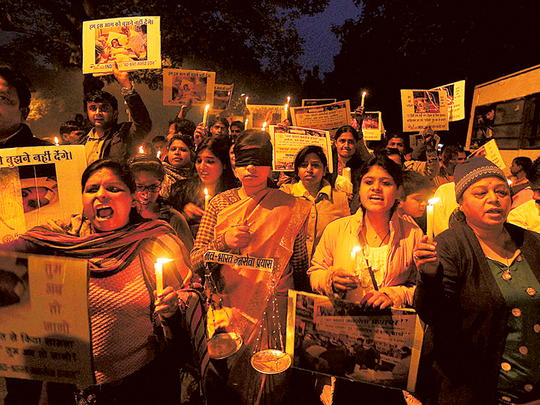
New Delhi: Home Minister of India Rajnath Singh on Tuesday took strong exception to a British filmmaker interviewing December 16 gang rape convict Mukesh Singh in Tihar jail, and sought a detailed report from the jail chief on the whole issue.
Taking the incident of the convict being interviewed in custody very “seriously”, the Home Minister spoke to Tihar jail Director-General Alok Kumar Verma and sought a detailed report on it urgently, official sources said.
During the telephonic conversation, the DG briefed the Home Minister about the incident and the action taken so far, sources said.
Media reports said British filmmaker Leslee Udwin and the BBC were given permission to interview bus driver Mukesh Singh, who was awarded death sentence for the brutal rape and murder of a 23-year-old girl on December 16, 2012.
In the interview, Mukesh said the women who went out at night had only themselves to blame if they attracted the attention of gangs of male molesters.
“A girl is far more responsible for rape than a boy,” he had said.
Mukesh also said that had the girl and her friend not tried to fight back, the gang would not have inflicted the savage beating, which led to her death later.
Describing the killing as an “accident”, he had said, “When being raped, she shouldn’t fight back. She should just be silent and allow the rape. Then they’d have dropped her off after ‘doing her’, and only hit the boy.”
Meanwhile, filmmaker Udwin, whose latest film has created a furore in India, on Tuesday said the film was her attempt to examine the attitude of men towards women.
Leslee also claimed she got permission from the then Director-General of Tijar jail Vimla Mehra before interviewing the convict Mukesh Singh.
“I wrote a letter to DG of Tihar. The DG of Tihar had to consult with Ministry for Home Affairs (MHA). The letter basically stated that it was a campaigning film. I had applied permission in May 2013 and I got the answer ‘yes’ in two weeks. Official permission of MHA had also came. Permission from the prison was also signed,” she said.
“India’s Daughter” tells the story of the horrific Delhi gang rape in December, 2012, from the perspective of the convicts and victim’s parents, she claimed.
“We took a lot of time to make the film, almost two years. If we had something sensational, then we would have thrown it out immediately. There is nothing sensational about the film. It’s a very serious campaigning film in the public interest. It’s designed to see the change,” Leslee told reporters here.
Before making the BBC documentary, Leslee said she met the parents of all the convicts including the juvenile’s.
“I actually met all the parents of the convict. Mukesh’s (Singh) mother got him to speak. I interviewed his mother and told her we were doing this film and it was important for us to speak to him. She told him to speak to us,” she said.
In the interview, Mukesh said the women who went out at night had only themselves to blame if they attracted the attention of gangs of male molesters. When asked why she gave a platform to the convict, Leslee, who interviewed Mukesh in 2013, said, “That’s a great pity. Indian media should highlight what is going on in their mind. You have to keep repeating it until it stops and changes.
“Do you want things to change. Why do you resist? Why did I give a platform to girl’s parents? The film looks at the issue of mindset and gender inequality. The film paints a picture of a set of attitudes towards women.”
The filmmaker asked people not to have preconceived notion about the movie, which will premiere in India on March 8 on NDTV channel.
“The film ends with global statistics around the world, country by country. Rape is not an Indian problem. It’s a global problem.”
The BAFTA-winning director, who claimed she had panic attack while making the film, said the most touching moment for her was to sit and watch the film with victim’s parents.
“Sitting and watching the film through their eyes was a touching moment for me. They were moved by the film. They are extraordinary human beings.”












